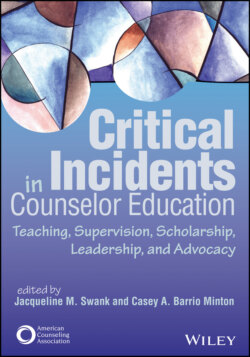Читать книгу Critical Incidents in Counselor Education - Группа авторов - Страница 45
Analysis of the Critical Incident
ОглавлениеThe ACA Code of Ethics (American Counseling Association [ACA], 2014) offers guidance on many aspects of Jessie’s case. Section B, Confidentiality and Privacy, calls for counselors to establish and uphold appropriate boundaries with clients to contribute to trust in the counseling relationship. Counselors’ disclosure of details about their personal worlds is often referred to as self-disclosure. A basic expectation of new counseling students is to learn and demonstrate basic counseling skills while also respecting boundaries for interpersonal disclosures. This expectation parallels the future obligation to maintain boundaries with clients, as excessive self-disclosure is ineffective and potentially damaging to counseling relationships (Remley & Herlihy, 2020; Young, 2017). Given the natural role of self-disclosure in social relationships, I restrict self-disclosure in beginning skills classes so students rely on their new counseling skills to build rapport instead. A foundational ethical obligation of counselors is to avoid harming clients (ACA, 2014, Standard A.4.a.); this is mirrored in Standard F.1.a., which holds supervisors responsible for monitoring supervisees’ performance. In this case, Jessie’s pattern of sharing detailed information about her history of abuse raises concerns regarding her ability to maintain professional boundaries, which could impact client welfare.
On a related note, counselor educators are also responsible for addressing potential competency concerns and providing remediation as needed (ACA, 2014, Standard F.9.b.). Professor X’s decision to reach out to Jessie after the first incident is aligned with providing formative evaluation and clarifying performance expectations for students (Standard F.9.a.). Another responsibility of counselor educators is to protect all students during experiential activities. Placing limits on topics allowed during role plays assists with upholding the spirit of practicing skills, not providing professional counseling, which is beyond the development of first-semester students. An additional benefit is avoiding exposure to content that may be triggering for students. Standard F.7.g. addresses the need for counselor educators to protect the rights of students when peers lead experiential activities. Professor X’s follow-up with Jessie’s peers reflects a desire to assess their experiences and provide guidance for the future.
Another important element is that Jessie may have a disability due to undisclosed mental health diagnoses. The Americans With Disabilities Act protects students who enter counseling programs with any disability, including a mental health diagnosis. It is not known whether Jessie has a current diagnosis; however, the circumstances of her incident imply that she could. Professor X initiated a dialogue with Jessie that sought to normalize Jessie’s history of trauma, sending the message that professional counselors can experience personal hardships and also become counselors.
